- Home
- Tom Stoppard
The Coast of Utopia: Voyage, Shipwreck, Salvage Page 3
The Coast of Utopia: Voyage, Shipwreck, Salvage Read online
Page 3
BELINSKY Hm. You don’t tell the reader what you think.
TURGENEV What I think? What has that got to do with the reader?
Belinsky laughs, coughs, slams his stick, recovers.
BELINSKY And what do you think about my letter to Gogol?
TURGENEV Oh … well, I don’t see the necessity for it.
BELINSKY Be careful, boy, or I’ll stand you in the corner.
TURGENEV You said what you had to say about his book in the Contemporary. Is this the future of criticism?—first the bad notice, then the abusive letter to the author?
BELINSKY The censor cut at least a third of my review. But that’s not the point. Gogol evidently thinks I rubbished his book, because he took a swipe at me. I’m not having that. He has to be made to understand that I took personal offence from cover to cover! I loved that man. I found him. Now he’s gone mad—and this apostle of Tsar Nicholas, this champion of serfdom, corporal punishment, censorship, ignorance and obscurantist piety, thinks I gave him a bad notice out of pique. His book is a crime against humanity and civilisation.
TURGENEV No—it’s a book … a bad, stupid book but with all the sincerity of religious mania—why drive him madder? You should pity him.
Belinsky thumps angrily with his stick.
BELINSKY It’s too important for pity. In other countries, the advance of civilised behaviour is everybody’s business. In Russia, there’s no division of labour, literature has to do it all. That was a hard lesson for me, boy. When I started off, I thought art was aimless, pure spirit. I was a young ruffian from the provinces, with the artistic credo of a Parisian dandy. Remember Gautier?—‘Fools! Cretins! A novel is not a pair of boots!’
TURGENEV ‘A sonnet is not a syringe! A play is not a railway!’
BELINSKY (chiming in with Turgenev) ‘A play is not a railway!’ Well, we have no railways, so that’s another job for literature, to open up the country. Are you laughing at me, boy? I once heard a government minister say he was against railways because they encouraged people who should stay put to indulge in purposeless travel with who knows what results. That’s what we’re up against.
TURGENEV I’m not pure spirit, but I’m not society’s keeper either. No, listen, Captain! People complain about me having no attitude in my stories. They’re puzzled. Do I approve or disapprove? Do I want the reader to agree with this man or the other man? Whose fault is it that this peasant is a useless drunkard, his or ours? What about this story I gave you?—is the bailiff worse than the master, or the master worse than the bailiff? Where does the author stand? Why doesn’t he come clean with us? Well, maybe I’m wrong, but how would that make me a better writer? What has it got to do with anything? (raising his voice) Why are you getting at me, anyway? I’m not well, you know—well, I’m not not well like you’re not well—(hastily)—though you’ll get better, don’t worry—sorry—but coming all this way to this dump to keep you company … Can we not talk about art and society with the waters sloshing through my kidneys? …
Belinsky, who has been coughing, is suddenly in distress. Turgenev comes to his aid.
TURGENEV (cont.) Easy, Captain! Easy …
BELINSKY (recovering) The waters of Salzbrunn are not the elixir of life, in my opinion. It’s a mystery how these places get their reputation. Anyone can see they’re killing people off like flies.
TURGENEV Let’s get out! Come with me to Berlin. I’ve got some friends going to London, I promised to see them off—or we can meet in Paris.
BELINSKY No, I …
TURGENEV You can’t go home without seeing Paris!
BELINSKY I suppose not.
TURGENEV Are you all right now?
BELINSKY Yes. (He drinks some water.)
TURGENEV (Pause.) So you didn’t like my story?
BELINSKY Who said? You’re going to be one of our great writers, one of the few—I’m never wrong.
TURGENEV (moved) Oh … (lightly) You said Fenimore Cooper was as great as Shakespeare.
BELINSKY That wasn’t wrong, it was only ridiculous.
There is a transition.
JULY 1847
Paris. La Place de la Concorde.
Turgenev and Belinsky are out walking. Belinsky stares gloomily around.
TURGENEV Herzen has established himself in the Avenue Marigny. He’s got a chandelier, and a footman to bring things in on a silver tray. The snow on his boots is all gone like les neiges d’antan. (He points.) The obelisk marks the spot where they had the guillotine.
BELINSKY They say the Place de la Concorde is the most beautiful square in the world, don’t they?
TURGENEV Yes.
BELINSKY Good. Well, I’ve seen it now. Let’s walk back to where I saw that red-and-white dressing gown in the window.
TURGENEV It was expensive.
BELINSKY I only want to look at it.
TURGENEV I’m sorry about … you know … going off to London like that.
BELINSKY It’s all right. (He coughs painfully.)
TURGENEV Are you getting tired? You wait here, I’ll go to the cab rank.
BELINSKY I could write amazing things in a dressing gown like that.
Turgenev leaves.
SEPTEMBER 1847
Belinsky recovers. A chandelier descends into view. Belinsky looks at it.
Herzen’s voice makes him turn, as the stage—the room—-fills simultaneously from different directions. Turgenev is unwrapping a shopping parcel. Natalie has a bag of toys and books from a shop. MADAME HAAG, who is Herzen’s mother and in her fifties, is in charge of Sasha and Kolya, who is technically aged four. Sasha is ‘speaking’ face-to-face with Kolya, saying ‘Kol-ya, Kol-ya’ with extra enunciation. Kolya has a spinning top. GEORGE HERWEGH, aged thirty, a beautiful young man with a feminine delicacy notwithstanding luxuriant facial hair and beard, lies on a chaise, romantically exhausted, having his brow dabbed with cologne by EMMA, his wife, who is blonde and handsome rather than pretty. NICHOLAS SAZONOV, aged thirty-five, a gentleman down on his luck, is in sympathetic attendance. A Nurse appears and involves herself with Madame and the two children. There is a SERVANT, a footman-valet, making himself useful as a waiter. In their dress, Herzen and Natalie have altered strikingly, transformed into Parisians. Herzen’s previously combed-back hair and ‘Russian’ beard have been stylishly barbered. In the first part of the scene, there are separate conversations going on. They take turns to occupy the vocal foreground, but they are all continuous.
HERZEN You always look at my chandelier.
TURGENEV (about the parcel) Can we see it? …
SASHA Kol-ya … Kol-ya …
HERZEN … there’s something about that chandelier …
BELINSKY No … I was just …
HERZEN … it makes my Russian friends uneasy. It says, ‘Herzen is our first bourgeois worthy of the name! What a loss to the intelligentsia!’
The Servant offers a tray of titbits to Mother with an aristocratic assurance.
SERVANT Madame … may one tempt you?
MOTHER No …
SERVANT Of course. Perhaps later.
The Servant offers his tray here and there, then leaves.
NATALIE Vissarion, look … look what I found in the toy shop …
SASHA Can I see?
MOTHER It’s not for you, you’ve got toys of your own, too many.
Natalie is delayed by Mother.
MOTHER (cont.) (upset) I can’t get used to your servant’s manner.
NATALIE Jean-Marie? But he has beautiful manners, Granny.
MOTHER That’s what I mean—he behaves as if he’s on equal terms, he makes conversation …
Turgenev reveals, from its tissue paper, a flamboyant silk robe with a large red design on white. He puts it on.
TURGENEV Yes … yes, very nice. You think you know somebody, and then it turns out you don’t.
BELINSKY (embarrassed) When I said Paris was a swamp of bourgeois greed and vulgarity, I meant apart from my dressing gown.
NATALIE It’s beautiful, you were right to get it. (showing her shopping) Now, see here, look—you can’t go home without something for your daughter …
BELINSKY Thank you …
SASHA Look, Kolya …
NATALIE Leave it alone! Come on, out you go … (to Nurse) Prenez les enfants …
SASHA (to Belinsky) They’re all girls’ things.
BELINSKY Yes … I had a little boy, but he died.
MOTHER Come on, my lamb, let’s go and see Tata … come, Sasha … a big boy like you, you want to play all the time …
HERZEN Oh, let him be a child, Maman.
Turgenev takes off the dressing gown. Natalie takes it and wraps it loosely.
NATALIE (to Turgenev) You’ve been in London?
TURGENEV Just for a week.
NATALIE Don’t be mysterious.
TURGENEV I’m not. Some friends of mine, the Viardots …
NATALIE You went to hear Pauline Viardot sing?
TURGENEV I wanted to see London.
NATALIE (laughs) All right, then, tell me what London is like.
TURGENEV Very foggy. Streets full of bulldogs …
Meanwhile, Mother, Sasha and Kolya negotiate their way out with the Nurse. Kolya leaves his top behind.
They encounter MICHAEL BAKUNIN entering. He is thirty-five, grandly bohemian. He greets Mother, kisses the children, and helps himself to a glass from the Servant’s salver.
BAKUNIN The Russians are here! (He kisses Natalie’s hand.) Natalie.
HERZEN Bakunin. Who’s with you?
BAKUNIN Annenkov and Botkin. We kept our cab—they’ve gone for two more.
NATALIE Good—we’re all going to the station.
BAKUNIN Sazonov! Mon frère! (confidentially) The green canary flies tonight—ten o’clock—usual place—pass it on.
SAZONOV I told you.
BAKUNIN (to George and Emma) I knew George was here. I could smell eau de cologne in the street. You’re supposed to drink it, you know, that’s the whole thing about German water—(to Belinsky) You didn’t waste your time in Salzbrunn dabbing it behind your ears, I hope. Turgenev! (He draws Turgenev aside.) This is the last thing I’ll ever ask of you.
TURGENEV No.
BELINSKY Is it time to go?
HERZEN Plenty of time.
BAKUNIN Belinsky!—Herzen says your letter to Gogol is a work of genius, he calls it your testament.
BELINSKY That doesn’t sound too hopeful.
BAKUNIN Listen, why go back to Russia? The Third Section’s got a cell all ready for you.
NATALIE Stop it!
BAKUNIN Bring your wife and daughter to Paris. Think of it—you could publish free of censorship.
BELINSKY That’s enough to put anyone off.
BAKUNIN What are you talking about? You could publish your letter to Gogol, and everyone would read it.
BELINSKY It wouldn’t mean anything … in this din of hacks and famous names … filling their columns every day with their bellowing and bleating and honking … it’s like a zoo where the seals throw fish to the public. None of it seems serious. At home the public look to writers as their real leaders. The title of poet or novelist really counts with us. Writers here, they think they’re enjoying success. They don’t know what success is. You have to be a writer in Russia, even one without much talent, even a critic … My articles get cut by the censor, but a week before the Contemporary comes out, students hang around Smirdin’s bookshop asking if it’s arrived yet … and then they pick up every echo the censor missed, and discuss it half the night and pass copies around … If the writers here only knew, they’d pack their bags for Moscow and St Petersburg.
He is met with silence. Then Bakunin embraces him, and Herzen, mopping his eyes, does likewise.
EMMA Sprecht Deutsch, bitte! [Speak German, please!]
Herzen, still moved, raises his glass to the room. The Russians soberly raise their glasses, toasting.
HERZEN Russia. We know. They don’t. But they’ll find out.
The Russians drink the toast.
BAKUNIN And I never said goodbye to you when I left.
BELINSKY We weren’t speaking.
BAKUNIN Ah—philosophy! Great days!
NATALIE (to Belinsky) Now, what about your wife?
BELINSKY Cambric handkerchiefs.
NATALIE That’s not very romantic.
BELINSKY Well, she’s not.
NATALIE Shame on you.
BELINSKY She’s a schoolteacher.
NATALIE What’s that got to do with it?
BELINSKY Nothing.
BAKUNIN (to Belinsky) Well, I’ll see you soon in St Petersburg.
HERZEN How can you go home? You’ve been sentenced in absentia for not going home when they summoned you.
BAKUNIN YOU forget about the revolution.
HERZEN What revolution?
BAKUNIN The Russian revolution.
HERZEN I’m sorry, I haven’t seen a paper today.
BAKUNIN The Tsar and all his works will be gone within a year, or two at the most.
SAZONOV (emotionally) We were children of the Decembrists. (to Herzen) When you were arrested, by some miracle they overlooked me and Ketscher.
HERZEN This is not a sensible conversation. There will have to be a European revolution first, and there’s no sign of it. There’s no movement among the people here. The opposition has no faith in itself. Six months ago meeting Ledru-Rollin or Louis Blanc in a café felt like being a cadet talking to veterans. Their superior condescension to a Russian seemed only proper. What had we got to offer? Belinsky’s articles and Granovsky’s lectures on history. But these celebrities of the left spend their time writing tomorrow’s headlines and hoping that someone else will make the news to go with them. And don’t they know what’s good for us! Virtue by decree. They’re building prisons out of the stones of the Bastille. There’s no country in the world that has shed more blood for liberty and understands it less. I’m going to Italy.
BAKUNIN (excitedly) Forget about the French. Polish independence is the only revolutionary spark in Europe. I’ve been here six years and I know what I’m talking about. I’m in the market for a hundred rifles, by the way, payment in cash.
Sazonov shushes him urgently. The Servant has entered. He whispers to Bakunin.
BAKUNIN (cont.) My cabbie wants to go home. Can you lend me five francs?
HERZEN No. You should have walked.
TURGENEV I’ll do it.
Turgenev gives five francs to the Servant, who leaves.
BELINSKY Isn’t it time to go?
SAZONOV (to Belinsky) It’s a shame. With your abilities, you could have done more, instead of wasting your time in Russia.
HERZEN (to Sazonov) And do tell us, what have you done? You don’t think discussing the borders of Poland with the émigrés every day in the Café Lamblin is doing something?—
SAZONOV Hold on, hold on, you forget our situation.
HERZEN What situation? You’ve lived in freedom all these years, playing statesmen-in-waiting and calling yourselves pink budgerigars—
SAZONOV (furiously) Who told you about the—
HERZEN You did.
SAZONOV (bursting into tears) I knew I wasn’t to be trusted!
EMMA Parlez français, s’il vous plaît!
BAKUNIN (comforting Sazonov with a hug) I trust you.
NATALIE Is George all right?
HERZEN I never saw a man more all right.
Natalie goes to George and Emma.
BAKUNIN (to Herzen) Don’t be deceived by George Herwegh. He got expelled from Saxony for political activity.
HERZEN Activity? George?
BAKUNIN And he’s got what every revolutionary needs, a rich wife.
HERZEN Nick Ogarev knew him when they were together in Paris … Nick gave me a letter …
BAKUNIN What’s more, she’ll do anything for him. I once heard Marx explaining economic relations to George for an hour while Emma rubbed his feet.
/> HERZEN Why?
BAKUNIN He said his feet were cold … other parts of him, it seems, are kept warm by the Contesse d’Agoult.
NATALIE (to Emma) Continuez, continuez …
HERZEN (offended) I won’t have tittle-tattle about my friends in my house … and anyway, you don’t know it’s true.
BAKUNIN (laughs) You’re right—maybe he’s only boasting.
Emma continues to smooth George’s brow.
NATALIE (arriving) Ah, that’s what love should be!
BAKUNIN Love is a mystery, and woman’s privilege is to be the priestess of the mystery, vestal of the sacred flame.
HERZEN Am I being reproached because I don’t let you mother me?
NATALIE I don’t reproach you, Alexander, I only say it’s a fine thing to see.
HERZEN What is? George having the vapours?
NATALIE No … a woman’s love that transcends egoism.
HERZEN Love without egoism cheats women of equality and independence, not to mention any other … satisfaction.
BAKUNIN He’s right, madame!
HERZEN But you just said the opposite!
BAKUNIN (unabashed) He’s right again!
GEORGE (in German) Emma, Emma …
EMMA Was ist denn, mein Herz? [What is it, my precious?]
GEORGE Weiss ich nicht … Warum machst du nicht weiter? [I don’t know … Why have you stopped?]
Emma resumes stroking his brow.
NATALIE (privately to Herzen) You’re being unkind.
HERZEN I like George, but I’d feel ridiculous.
NATALIE (angrily) Idealised love doesn’t mean a lack of … or perhaps you think it does?
HERZEN What’s this?
NATALIE It’s despicable to imply George doesn’t … satisfy a woman …

 The Dog It Was That Died and Other Plays
The Dog It Was That Died and Other Plays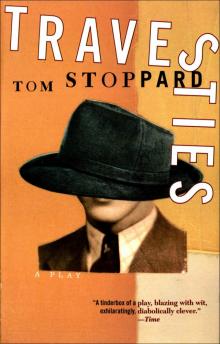 Travesties
Travesties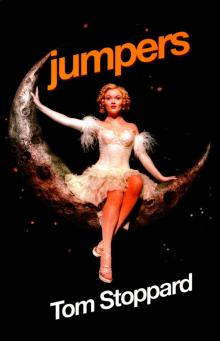 Jumpers
Jumpers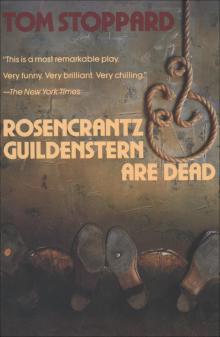 Rosencrantz and Guildenstern Are Dead
Rosencrantz and Guildenstern Are Dead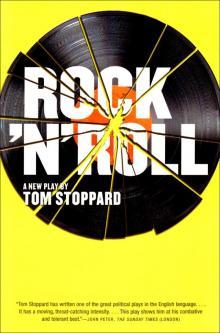 Rock 'N' Roll
Rock 'N' Roll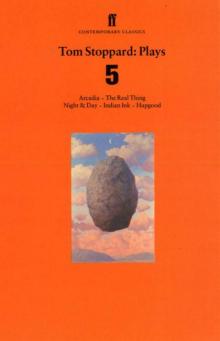 Plays 5
Plays 5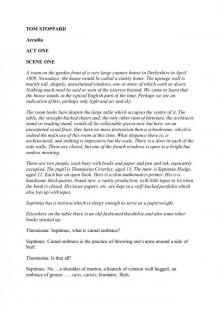 Arcadia
Arcadia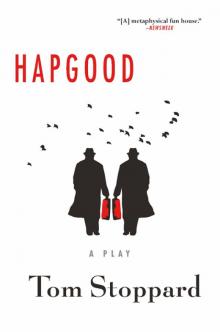 Hapgood
Hapgood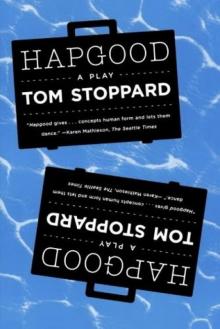 Hapgood: A Play
Hapgood: A Play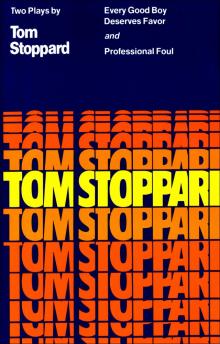 Every Good Boy Deserves Favor & Professional Foul
Every Good Boy Deserves Favor & Professional Foul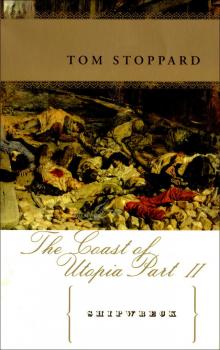 The Coast of Utopia: Voyage, Shipwreck, Salvage
The Coast of Utopia: Voyage, Shipwreck, Salvage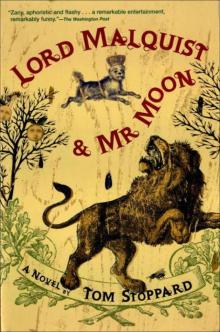 Lord Malquist & Mr. Moon
Lord Malquist & Mr. Moon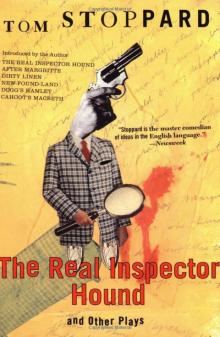 The Real Inspector Hound and Other Plays
The Real Inspector Hound and Other Plays Tom Stoppard Plays 1
Tom Stoppard Plays 1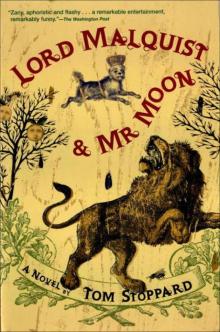 Lord Malquist & Mr. Moon: A Novel
Lord Malquist & Mr. Moon: A Novel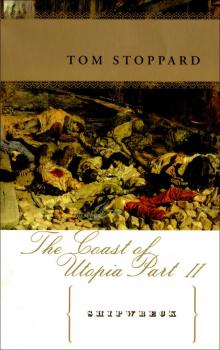 Shipwreck
Shipwreck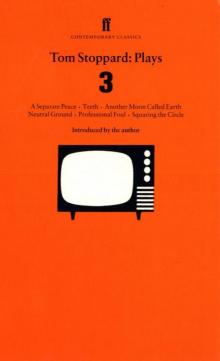 Tom Stoppard Plays 3
Tom Stoppard Plays 3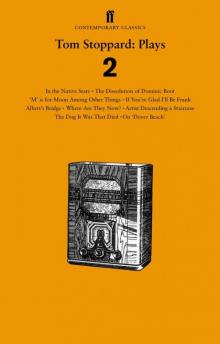 Tom Stoppard Plays 2
Tom Stoppard Plays 2 Rosencrantz and Guildenstern are dead. Arcadia
Rosencrantz and Guildenstern are dead. Arcadia